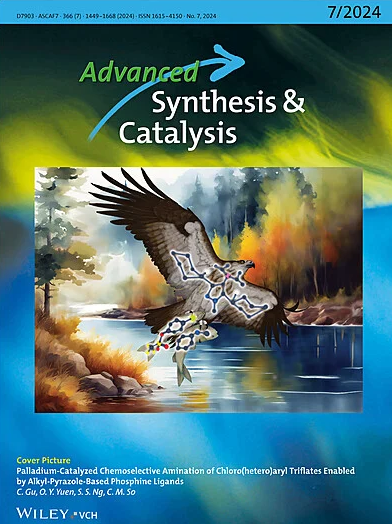Thiazolium Salts: From Thiamine to Cutting-Edge Organocatalysts
IF 4
2区 化学
Q2 CHEMISTRY, APPLIED
引用次数: 0
Abstract
In this comprehensive review, the history of thiazolium salts as N-Heterocyclic Carbenes (NHC) in organocatalytic reactions is intended to be presented. Although the subject (i.e., NHC in organocatalysis) has been covered in several reviews in past years, the idea here stands on the exclusive use of thiazolium salts in such transformations. Indeed, thiazoliums and their related NHCs are the first identified as efficient mediators for the CC bond formation through its peculiar ability to reverse the classical reactivity (umpolung) of carbonyl groups. However, they are relatively quickly overtaken by other classes of NHCs generated from imidazolium and triazolium salts. Even though, thiazolylidenes are still better catalysts in some particular reactions affording outstanding results in terms of conversion and selectivity. Owing to the remarkably high number of reactions that are made possible thanks to the very characteristic properties of such NHCs, the aim of this review is to provide a full account on the discovery and evolution of thiazolium salts and thiazolylidenes in NHC organocatalysis. Information is first provided on their synthesis, structural evolution, physicochemical and electronic properties, and then reactivity and application in various organocatalytic methodologies.

噻唑盐:从硫胺素到尖端的有机催化剂
本文综述了噻唑盐作为n -杂环羰基(NHC)在有机催化反应中的应用历史。虽然这一主题(即有机催化中的NHC)在过去几年中已经在几篇综述中被涵盖,但这里的想法是在这种转化中只使用噻唑盐。事实上,噻唑类及其相关NHCs是第一个通过其特有的逆转羰基经典反应性(unpolung)的能力被确定为C - _ - C键形成的有效介质。然而,它们很快就被由咪唑和三唑盐产生的其他类别的NHCs所取代。尽管如此,在某些特定的反应中,噻唑二烯仍然是更好的催化剂,在转化率和选择性方面取得了突出的成果。由于这些NHCs的特性使得大量的反应成为可能,本文的目的是对NHCs有机催化中噻唑盐和噻唑聚醚的发现和演变提供一个完整的描述。首先介绍了它们的合成、结构演变、物理化学和电子性质,然后介绍了它们的反应性及其在各种有机催化方法中的应用。
本文章由计算机程序翻译,如有差异,请以英文原文为准。
求助全文
约1分钟内获得全文
求助全文
来源期刊

Advanced Synthesis & Catalysis
化学-应用化学
CiteScore
9.40
自引率
7.40%
发文量
447
审稿时长
1.8 months
期刊介绍:
Advanced Synthesis & Catalysis (ASC) is the leading primary journal in organic, organometallic, and applied chemistry.
The high impact of ASC can be attributed to the unique focus of the journal, which publishes exciting new results from academic and industrial labs on efficient, practical, and environmentally friendly organic synthesis. While homogeneous, heterogeneous, organic, and enzyme catalysis are key technologies to achieve green synthesis, significant contributions to the same goal by synthesis design, reaction techniques, flow chemistry, and continuous processing, multiphase catalysis, green solvents, catalyst immobilization, and recycling, separation science, and process development are also featured in ASC. The Aims and Scope can be found in the Notice to Authors or on the first page of the table of contents in every issue.
 求助内容:
求助内容: 应助结果提醒方式:
应助结果提醒方式:


